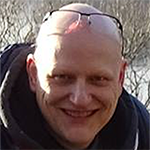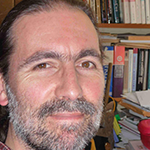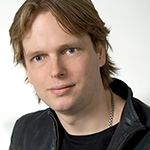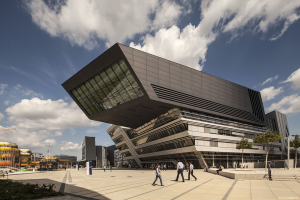Decentralised Web Symposium
Vienna University of Economics and Business
January 17, 2020
Over the last few years the notion of a decentralised Web has emerged: where individuals and organisations are empowered to control and manage their digital assets. We are in the process of establishing an interdisciplinary network of researchers to have a common dialogue on the technical issues related to this decentralised Web and how these issues relate to social, economic, and policy aspects. The Decent(ralised) Web Symposium will serve as the initialisation of our common activities. As such we would like to invite researchers with an interest in technologies associated with our concept. In particular envisage the following (non-exhaustive) list of topics being covered:
– Decentralised infrastructures
– Multi-agent systems
– Collective intelligence
– Blockchains and the Web
– Cyber Physical Social Systems
Space at the symposium will be restricted to 200 attendees. Please can we ask you to add a short abstract outlining why you are interested in the event and any related work when you register interest. This will help us select a cross disciplinary set of attendees.
Call for Lightning Talks and Posters
The symposium will also feature a time slot for 10-12 lightning talks, as well as space for posters, to allow participants to share their vision, challenges and/or current work. If you are interested in giving a lightning talk, please submit title and abstract of your proposal using this form before 18th December 2019 for review by the organising committee. We will send notifications of decisions on 20th December 2019.
Invited Talks and Keynotes
Anna De Liddo

My research focuses on the socio-technical factors influencing the design and uptake of Collective Intelligence infrastructures. These are online environments which seek to improve collective awareness of the changing environment, and collective capacity to make the best use of expertise to problem solve, and adapt appropriately. I have particular interests in knowledge construction through discourse, and the role of technology in scaffolding dialogue and argumentation in contested domains, in which there is more than one point of view. The approaches I work with are network-centric, modelling and visualising ideas and arguments as networks of nodes which can be analysed for topographical and semantic patterns.
As background, I am an Urban Planner and Designer; I took a BSc in Civil Engineering, a MSc in Transport Planning at Polytechnic of Bari, Italy, and a MSc in Environmental Policy and Management at Institut National des Sience Appliquees in Lyon (France). I gained my PhD in Urban and Environmental Planning at Polytechnic of Bari, Italy, investigating ICT for Participatory Planning and Deliberation. In this respect I am interested in investigating tools to support knowledge representation, structuring and management, particularly with regards to collaborative decision-making processes in Environmental and Urban Planning domain.
Luc Desrosiers

As an IBM Certified IT Architect working in the field of blockchain, I have the unique opportunity of working with many industries and customers. I believe that in an open and decentralised web, blockchain technologies have an essential role to play, and the concept of decentralised identity has to be at the core of this new world.
Blockchain & Self-Sovereign Identities…A match made in heaven?
The blockchain hype has been around for a few years now. As the magic evaporates and the real-life patterns emerge, we are starting to see how the concepts and techniques can be applied successfully. In this presentation, we will focus on one key usage pattern of the technology: self-sovereign identity. Starting from the business concepts and leveraging real-use cases, we will explain how it works and then take you through the technical details that underpin this technology.
Hugh Dickinson

I am an astrophysics researcher working at the Open University in the UK. I have several years’ experience working in several subfields of astrophysics and astronomy with a focus on analysis and interpretation of extensive observational datasets. Modern astrophysical instruments provide exquisite, high-quality data in unprecedented volumes and with increasing complexity and diversity. Analysing these data is a significant challenge facing modern astrophysics research.
My research explores the ways that citizen science can help to unlock the scientific insights that these and future data contain. Citizen science has enabled the collective participation of millions of interested volunteers from around the World to help solve scientific problems that could not be addressed by individual researchers or research teams. Notwithstanding the increasing power and prevalence of Deep Learning algorithms, human volunteers continue to outperform automatic analyses in terms of intuitive perceptiveness and the potential for serendipitous discovery.
The Zooniverse: People Powering Research
The Zooniverse is an open-source web infrastructure that implements the world’s largest and most popular platform for people-powered research. The Zooniverse platform has helped to democratise academic research across multiple realms extending far beyond my own primary research interests in astronomy and the physical sciences. I now work with Zooniverse collaborators to develop new techniques that will improve the experience for participating volunteers and enhance their engagement with cutting edge scientific research. In so doing, we aim optimise the scientific utility that we can derive from their collective insights and intelligence.
Julian Padget

Julian Padget is a reader in Computer Science at the University of Bath and a member of the Artificial Intelligence group. He received a BSc in Computational Science from the University of Leeds and a PhD in Mathematics from the University of Bath.
His research focus is intelligent agents, with particular focus on their utilisation in business processes, the formal specification, verification and monitoring of operational constraints (policies) for mixed human/software systems and the interaction of intelligent systems with the physical world through sensors and robots. The work includes theoretical contributions using computational logic and inductive logic programming with practical applications in agent architecture, legal reasoning, security analysis, privacy policies, agent-based simulation, requirements engineering, frameworks for socio-cognitive systems and computer games. Related and earlier work involves distributed systems, programming language design, semantic web services and computer algebra.
Policy as code… as a service
This talk explores the impact and benefits for transparency and accountability, and thereby generation of trust in AI-based socio-cognitive technical systems, that may arise from the representation of policies in a form that humans can author/read and software can use, either in its decision making or in continuous compliance checking of black box components.
We will outline some of the research challenges and potential solutions in the creation of a policy-making pipeline, that goes from policy elicitation, through textual analysis, semantic and computational modelling to validation, compliance checking and policy revision.
We further observe that although humans are quite good at designing policies, they still make plenty of mistakes and that policy creation and revision for the cyber world needs to be a continuous process, where compliance and fitness for purpose are checked all the time, by both humans and software, where both are viewed as joint stakeholders.
Markus Sabadello

Markus Sabadello has been a pioneer and leader in the field of digital identity for many years and has contributed to cutting-edge technologies that have emerged in this space. He is co-editor of the Decentralised Identifier specification at W3C, co-chair of the Identifier Working Group at the Decentralised Identity Foundation, and member of the Technical Governance Board at Sovrin Foundation. Markus has spoken at dozens of conferences and published papers about both the politics and technologies of digital identity. In 2015 he founded Danube Tech, a consulting and development company that works on SSI infrastructure.
Panel Perspective
Self-sovereign identity (SSI) is gaining more and more momentum as a movement that is both ideological and technological. The underlying promise is to build digital infrastructure that puts individuals at the centre of their online relationships and transactions, and that removes
dependencies on central authorities and intermediaries. Hundreds of Proofs-of-Concept are happening around the world, and key technical building blocks are being standardised at the World Wide Web consortium, the Decentralised Identity Foundation, and other places.
Sarah Spiekermann

Since 2009 Sarah Spiekermann is chairing the Institute for Information Systems & Society at Vienna University of Economics and Business (WU Vienna). She is a well-regarded scientist, author, speaker and advisor on digital ethics. She published several books, including “Digital Ethics – A Value System for the 21st Century” (Droemer, 2019), “Ethical IT Innovation: A Value-based System Design Approach” (Taylor & Francis, 2015), as well as “Networks of Control” (Facultas, 20116). In 2016 Sarah founded the Privacy & Sustainable Computing Lab at WU Vienna. To date she has published over 100 scientific articles on the social and ethical implications of computer systems and given more than 200 talks about her work. She has co-authored US/EU privacy regulation and worked as an expert and advisor to companies and governmental institutions, including the EU Commission and the OECD. Sarah also maintains a blog on “The Ethical Machine” at Austria’s leading daily newspaper Standard.at and is on the advisory board of the Austrian Digitalisation Agency.
Value-based System Design and Development
In order to make the Web decent again we need to engage in value based system design and development; we would need to anticipate as foresight engineers what our technologies are doing to the wellbeing of individuals as well as organisations. If we do not dedicate ourselves to understand the implications of technology we risk putting a lot of stuff out there that we later regret.
Ruben Verborgh

Ruben Verborgh is a professor of Decentralised Web technology at IDLab, Ghent University – imec, and a research affiliate at the Decentralised Information Groupof CSAIL at MIT. Additionally, he acts as a technology advocate for Inrupt and the Solid ecosystem wherein people and organisations control their own data. He aims to build a more intelligent generation of clients for a decentralised Web at the intersection of Linked Data and hypermedia-driven Web APIs. Through the creation of Linked Data Fragments, he introduced a new paradigm for query processing at Web scale. He has co-authored two books on Linked Data, and contributed to more than 250 publications for international conferences and journals on Web-related topics.
Panel Perspective
Data interoperability and scalability are the main challenges of the decentralised Web. There are many more components to it than technology, not in the least appropriate business models. However, a clear vision on technology is a prerequisite, and researchers need to foresee the problems we will encounter when the decentralised Web becomes a reality.
Lightning Talks & Posters
Download as a PDF
Josiane Xavier Parreira
Siemens AG Austria
IoTCrawler – A decentralised search engine for the Internet of Things
We present the IoTCrawler project, which addresses search and discovery for the Internet of Things. Given the sheer amount of IoT devices and the data they generate, service discovery, search, and access methods for the IoT are indispensable. IoTCrawler offers an adaptable, decentralised and dynamic solution for IoT data integration, covering the different steps for enabling IoT search, from discovery and semantic description of data and services, to distributed indexing and ranking methods.
Terry Payne
University of Liverpool
Evolution of Inter-operable Agents
In this talk, I will discuss existing paradigms for addressing interoperability between heterogeneous autonomous systems, from the discovery of ontology alignments between agents vocabularies, to the evolution and adaptation of the vocabulary itself. A vision for autonomous agents will be presented that evolve their vocabularies and ontologies to facilitate rational interoperation, together with opportunities and challenges.
Angela Bonifati
Lyon 1 University
Declarative Linked Data Anonymization
Privacy is a major concern when publishing new datasets in the context of Linked Open Data (LOD). A new dataset published in the LOD is indeed exposed to privacy breaches due to the links to other datasets. In our work, we have considered privacy and utility policies as queries and conceived algorithms to produce sequences of SPARQL anonymization operations to apply those policies. Given a set of privacy queries as input, we have also studied the data-independent safety problem in practice.
Tobias Kuhn
VU University Amsterdam
Decentralised Semantic Publishing with Nanopublications
Nanopublications have been proposed as a format to publish small semantic snippets of scientific results in a provenance-aware manner, but they can also be seen as a general Linked Data container format. I will show in this talk how nanopublications can be combined with cryptographic techniques to enable general-purpose decentralised publishing and querying of machine-interpretable knowledge.
Sascha Meckler
Fraunhofer SCS, 90411 Nuremberg, Germany
A data integration and communication platform for distributed healthcare software systems
Efficient healthcare services require a frequent data exchange between the patients and their families, their doctors and the nursing personal, as well as associated software systems. The talk presents the concept of a communication platform for interconnecting distributed healthcare-related software systems. The platform uses semantic data integration for querying metadata and provides an intermediary Identity Provider that manages the patients’ data access policies and delegates authorization.
Pascal Molli
University of Nantes
DeKaloG: Decentralised Knowledge Graph
DeKaloG follows the vision of a global decentralised knowledge graph. It promotes 3 principles and a sustainable approach for implementing them: Accessibility is the right to execute any query at any time on a KG and get complete answers. Transparency ensures the right to know who built the KG, how it was built and from which sources. Findability is the right to find efficiently pertinent KGs for a query, i.e. which KGs contain relevant facts for the query.
Amr Azzam
WU Wien
Democratizing Access to Decentralised Knowledge Graphs
We propose an approach to combine SPARQL endpoints and client-side query processing, in an optimal, decentralised manner: we believe that a hybrid approach to query processing, that combines RDF partition shipping, TPF intermediate results shipping, and full endpoint results shipping, could provide a stable and responsive public query interface, even for data providers that do not have access to highly available servers, therefore lowering one of the main entry barriers to serve Linked Data.
Andrei Ciortea
University of St. Gallen
Rethinking Multi-Agent Systems for the World Wide Web
Recent standards are turning hypermedia into a homogenous information fabric that interconnects everything: physical objects, documents, abstract concepts etc. Clients can not only browse, but also observe and act on this hypermedia fabric. We present our vision for a new class of multi-agent systems that are: 1) aligned with the Web architecture to inherit the properties of the Web as a world-wide, open, and long-lived system, and 2) transparent and accountable to support acceptance by people.
Daniel Schraudner
Chair of Technical Information Systems, Friedrich-Alexander University Erlangen, Nuremberg
MOSAIK – A decentralised Multi-Agent System built on Semantic Web Technologies
We present the publicly founded research project MOSAIK, which has the goal to build a decentralised, self-organizing MAS to supersede existing centralized systems in companies. Bosch, a project partner, delivers a concrete use case: We want to investigate how to build an adaptive, self-organizing shop floor and use Semantic Web technologies for the infrastructure. Our main approach is using the concept of stigmergy and trying to shift most of the complexity from agents to the environment.
Katja Hose
Aalborg University
A Reliable Web of Data
The Semantic Web provides access to vast amounts of data covering diverse domains. Unfortunately, it relies solely on the data providers to publish their datasets through either downloadable data dumps, SPARQL endpoints, or dereferenceable URIs. Because of this centralization, data is often not available, e.g., unavailable SPARQL endpoints. In this short talk, I will highlight these problems and sketch a possible solution based on P2P technologies (PIQNIC).
Ruben Taelman
IDLab, Ghent University, imec
Scholarly Communications Using the Decentralised Web
We envision an alternative scholarly communication system that is aligned with Decentralised Web concepts and technologies. In this vision, researchers use a personal domain and associated storage space as their long-term scholarly hub, and the core functions of scholarly communication are fulfilled in a decoupled manner. We propose a technical exploration into the nature and feasibility of such a scholarly communication system, to enable a decentralised and decoupled scholarly Web.
Simon Steyskal
Siemens AG Austria
Towards Querying in Decentralised Environments with Privacy-Preserving Aggregation
The Web, as it was envisioned originally, is a free, decentralised platform. However, in recent years, this vision of a decentralised Web has become less and less emphasized, and the Web has been growing increasingly more centralized. For these reasons, there is a push for re-decentralising the Web, to give people back the ownership of their data (cf. Solid). In this talk, we share our vision on querying in decentralised environments in an efficient and privacy-preserving manner.
Vishwajeet Pattanaik
Tallinn University of Technology, Estonia
Leveraging the Power of the Crowd to Save the Web
Motivated by the ever-rising facing the Web, we propose a naive DOM-oriented edit distance anchoring approach implemented into a web annotation tool. We argue the tool, could help foster the creation of an end-user collaborative environment that could help tackle these threats; by allowing web users to contribute to improving the quality of textual content on the web by annotating, archiving, linking, sharing and semantically describing content on-the-fly.
Axel Polleres
WU Wien
The role of decentralisation for holistic digital eco-systems
Open Data eco-systems are becoming a major priority in the EU on both European and National levels for both enabling the data-value chain, but also as a pillar for Artificial Intelligence strategies. In this talk I will argue that decentralisation and the ability to control own, sensitive data assets separately is not only attractive on an individual but also at an enterprise level as well as in the interplay between governments, (small and medium) enterprises and citizens. That is, infrastructures for personal data stores, which have become popular in the context of privacy-preservation on an individual level, could also be leveraged in order to link small and medium enterprises in a decentralised fashion with each other or with public administrations, etc., thereby transferring the MyData idea to an enterprise level. Through this way decentralised platforms, also different bodies of public administrations could interact more efficiently with both enterprises and citizens. We envision that promoting such platforms, along with dual principles of (sensitive) data minimisation and (open) data maximization, could be en enabler for a functioning data-value chain as a true alternative to centralized state- or enterprise-controlled data silos.
Venue
WU (Vienna University of Economics and Business)
Welthandelsplatz 1,
1020 Vienna, Austria
Campus map
Prater (U2) and Krieau (U2). The U-Bahn map can be found on
the Vienna tourist information site.
Travel
Arrival by airplane
If you are traveling to Vienna by plane, you will arrive at Vienna International Airport in Schwechat.
To get from Vienna International Airport, located outside the city limits, to the city centre, you can take the Schnellbahn (S-Bahn), City Airport Train (CAT), the Airport Express bus or a taxi.
By ‘S7’ Schnellbahn (S-Bahn):
Please make sure to board the train towards ‘Wolfsthal’ or ‘Flughafen’ when going to the airport. From the airport, take the train towards ‘Wien Mitte’, ‘Wien Nord’ or ‘Floridsdorf’.
By City Airport train:
The City Airport Train (CAT) leaves every half hour from the city centre (subway station ‘Landstraße/Wien-Mitte’) and the airport. The trip takes 16 minutes.
By Airport Express Busses:
Airport Express Busses from the Vienna Airport Lines connect the city centre and Vienna International Airport via four lines:
Vienna International Airport – Morzinplatz/Schwedenplatz
Vienna International Airport – Wien Meidling – Wien Westbahnhof
Vienna International Airport – Kaisermühlen VIC – Kagran
Vienna International Airport – Mödling – Baden
For further information about timetables and fares, see the bus connections page on the Vienna Airport Website or the Website of Vienna Airport Lines.
N.B. Bratislava Airport is located 65 km from the centre of Vienna. A bus from Südtiroler Platz (the U1 subway line stops there) will take you to Bratislava Airport in approximately 90 minutes.
Arrival by train
All of Vienna’s train stations are connected to the public transport system. For further information, please go to ‘Wiener Linien’ (Vienna public transport).
Public transport
For details on public transport in Vienna see the Vienna city Website.
Hotel information
Recommended hotels closest to the meeting location in Vienna:
Austria Trend Hotel Messe Prater Wien
Chairs
John Domingue, The Open University
Sabrina Kirrane, Vienna University of Economics and Business
Luis-Daniel Ibañez, University of Southampton
Elena Simperl, University of Southampton
Allan Third, The Open University
Ruben Verborgh, Ghent University — imec
Olaf Hartig, Linköping University




You must be logged in to post a comment.